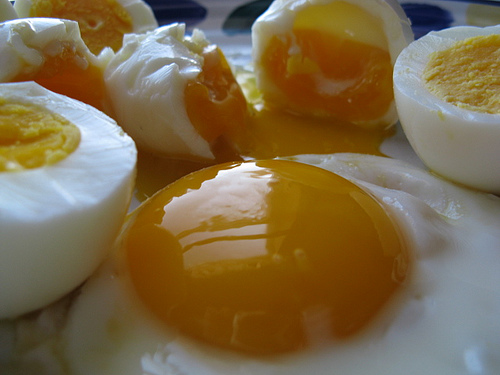Here are 10 foods that boost nutrition, improve brain function and keep our memories sharp.
 Eggs. Eggs have gotten a bad rap for being high in cholesterol, but they actually are an excellent source of high-quality protein and contain choline, which aids in brain cell development. Put eggs back on your menu; if you have high cholesterol, limit to four whole eggs per week. There is no restriction on egg whites and egg substitute.
Eggs. Eggs have gotten a bad rap for being high in cholesterol, but they actually are an excellent source of high-quality protein and contain choline, which aids in brain cell development. Put eggs back on your menu; if you have high cholesterol, limit to four whole eggs per week. There is no restriction on egg whites and egg substitute. Fish. A growing body of research is finding links between brain health and DHA, a form of omega-3 fatty acids. The American Heart Association recommends that we consume two to three servings of fatty fish per week, which can include sardines, herring, mackerel, trout, salmon and tuna.
Fish. A growing body of research is finding links between brain health and DHA, a form of omega-3 fatty acids. The American Heart Association recommends that we consume two to three servings of fatty fish per week, which can include sardines, herring, mackerel, trout, salmon and tuna. Seeds. Pumpkin, flax and sunflower seeds carry nutrients to boost your mood and brain power. These seeds can lower cholesterol, as well as add fiber and omega-3 fats, so sprinkle some on salads, cooked vegetables and cereal for extra crunch.
Seeds. Pumpkin, flax and sunflower seeds carry nutrients to boost your mood and brain power. These seeds can lower cholesterol, as well as add fiber and omega-3 fats, so sprinkle some on salads, cooked vegetables and cereal for extra crunch. Berries. Blueberries are a powerhouse when it comes to nutrition. In one study, aging lab animals that ate the equivalent of one-half to one cup of blueberries every day for two months performed better on tests of memory, coordination and balance than those that didn't eat the fruit. If you don't like blueberries, any type of berry is beneficial, so throw some in your cereal each morning.
Berries. Blueberries are a powerhouse when it comes to nutrition. In one study, aging lab animals that ate the equivalent of one-half to one cup of blueberries every day for two months performed better on tests of memory, coordination and balance than those that didn't eat the fruit. If you don't like blueberries, any type of berry is beneficial, so throw some in your cereal each morning. Kale. Kale is an excellent source of the mineral manganese, which is important for nervous system functioning, energy production and defending against free radicals. Wash fresh kale well, saute with olive oil and minced garlic, or add it to lasagna, pizzas, omelets, soups and stew.
Kale. Kale is an excellent source of the mineral manganese, which is important for nervous system functioning, energy production and defending against free radicals. Wash fresh kale well, saute with olive oil and minced garlic, or add it to lasagna, pizzas, omelets, soups and stew. Water. Drinking adequate amounts of water can help our energy levels and skin, and aid in weight loss. Conversely, dehydration diminishes our response time, mood and ability to concentrate.
Water. Drinking adequate amounts of water can help our energy levels and skin, and aid in weight loss. Conversely, dehydration diminishes our response time, mood and ability to concentrate. Tomatoes. Tomatoes contain lycopene, another powerful antioxidant. Cooked tomatoes have a greater amount of this nutrient, so include them in chili, soups and pasta sauces.
Tomatoes. Tomatoes contain lycopene, another powerful antioxidant. Cooked tomatoes have a greater amount of this nutrient, so include them in chili, soups and pasta sauces. Sweet potatoes. The orange flesh is high in beta-carotene, which is another antioxidant that takes care of the damaging free radicals in our system. Toss peeled sweet potato wedges with olive oil and roast on a baking sheet for 20 minutes at 400 degrees until tender. You also can steam chunks of peeled sweet potato until tender and mash with orange juice.
Sweet potatoes. The orange flesh is high in beta-carotene, which is another antioxidant that takes care of the damaging free radicals in our system. Toss peeled sweet potato wedges with olive oil and roast on a baking sheet for 20 minutes at 400 degrees until tender. You also can steam chunks of peeled sweet potato until tender and mash with orange juice. Nuts. Nuts are a key component of the Mediterranean diet, which researchers have found to aid in preventing cardiovascular disease, and lower our risk for developing Alzheimer's disease. Include a serving (one-quarter cup) of walnuts or almonds daily.
Nuts. Nuts are a key component of the Mediterranean diet, which researchers have found to aid in preventing cardiovascular disease, and lower our risk for developing Alzheimer's disease. Include a serving (one-quarter cup) of walnuts or almonds daily. Tea. Researchers from China found that people who drink the most tea were 71 percent less likely to develop Parkinson's disease. The polyphenols found in tea are thought to act as free radical scavengers that help brain function.
Tea. Researchers from China found that people who drink the most tea were 71 percent less likely to develop Parkinson's disease. The polyphenols found in tea are thought to act as free radical scavengers that help brain function.
No comments:
Post a Comment